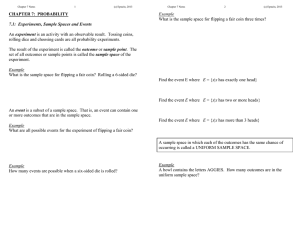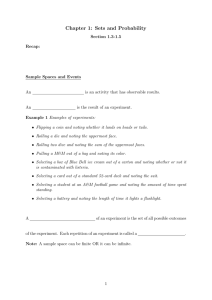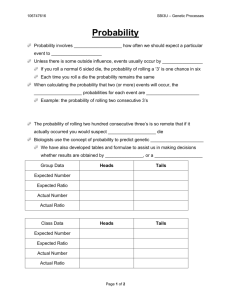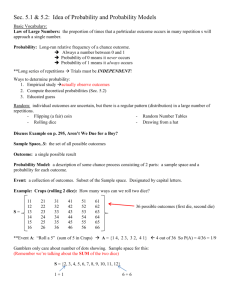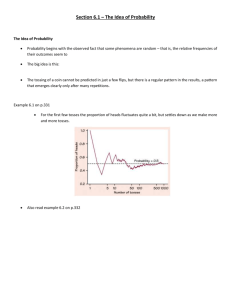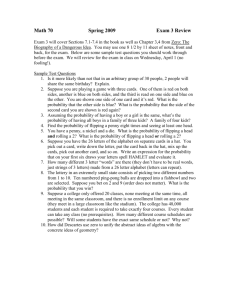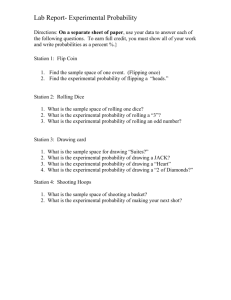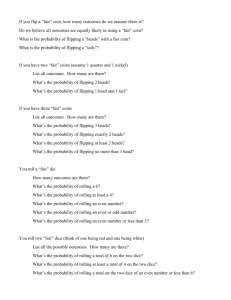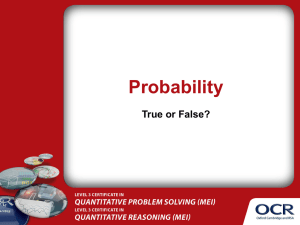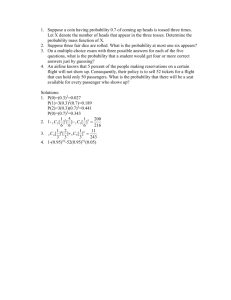Chapter 1: Sets and Probability
advertisement
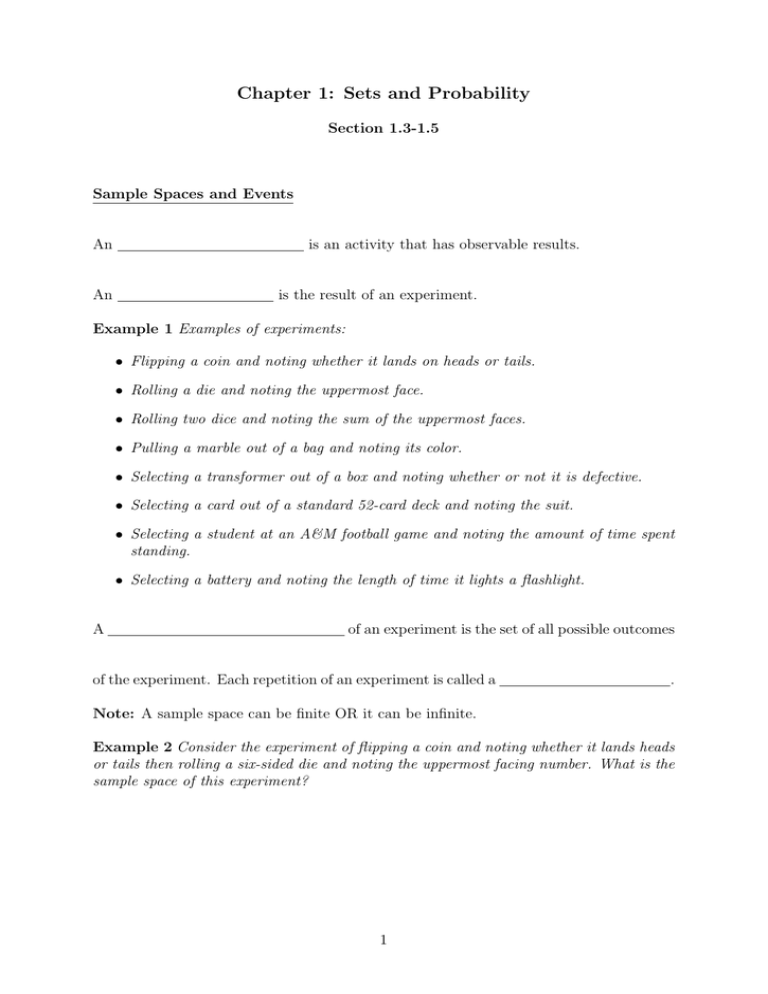
Chapter 1: Sets and Probability
Section 1.3-1.5
Sample Spaces and Events
An
An
is an activity that has observable results.
is the result of an experiment.
Example 1 Examples of experiments:
• Flipping a coin and noting whether it lands on heads or tails.
• Rolling a die and noting the uppermost face.
• Rolling two dice and noting the sum of the uppermost faces.
• Pulling a marble out of a bag and noting its color.
• Selecting a transformer out of a box and noting whether or not it is defective.
• Selecting a card out of a standard 52-card deck and noting the suit.
• Selecting a student at an A&M football game and noting the amount of time spent
standing.
• Selecting a battery and noting the length of time it lights a flashlight.
A
of an experiment is the set of all possible outcomes
of the experiment. Each repetition of an experiment is called a
.
Note: A sample space can be finite OR it can be infinite.
Example 2 Consider the experiment of flipping a coin and noting whether it lands heads
or tails then rolling a six-sided die and noting the uppermost facing number. What is the
sample space of this experiment?
1
When an experiment consists of a sequence of tasks, we can represent it by a
.
Example 3 Draw a tree diagram for the experiment in the last example.
Given a sample space S for an experiment, an
of S. (That is, a subset of the possible outcomes.)
An
single outcome.
is any subset E
(or simple) event is an event with a
Example 4 Consider the experiment from the previous two examples.
a) List the elementary events of this experiment.
b) Indicate the outcomes in the event where you roll an even number.
c) Indicate the outcomes in the event where you flip a heads.
d) Indicate the outcomes in the event where you flip a heads and roll an even number.
e) Indicate the outcomes in the event where you flip a tails and flip a heads.
2
If E and F are two events, then
is the
events and consists of the set of outcomes that are in E or F .
of the two
S
E
F
If E and F are two events, then
is the
of the two events and consists of the set of outcomes that are in both E and F .
S
E
F
If E is an event, then
is the
consists of the set of outcomes that are not in E.
S
E
3
of E and
Example 5 Consider the sample space of the experiment from the last several examples.
Let E be the event where you roll an even number, F be the event where you flip a heads,
and G be the event where you roll a 1.
a) List the elements of E, F , and G.
b) Find E ∪ G.
c) Find E ∩ F .
d) Find F C .
event.
The empty set is called the
Example 6 Consider the experiment of flipping a coin and the events H and T (where
H represents the event of flipping a heads and T is the event of flipping a tails). Then
H ∩ T = ∅, thus H ∩ T is an impossible event.
Let S be a sample space. The event S is called the
event.
Two events E and F are said to be
if the sets are disjoint. That is,
Example 7 Consider the experiment of rolling two fair six-sided dice and observing the
numbers that are rolled on each die. Let E be the event that the sum of the two dice is 5.
Let F be the event that the number on the first die is exactly 1 more than the number on
the second die. Let G be the event that a 6 is rolled.
a) Are E and F mutually exclusive?
4
b) Are E and G mutually exclusive?
Standard Deck of 52 Playing Cards: A standard deck of 52 playing cards has four
13-card suits: clubs ♣, diamonds ♦, hearts ♥, and spades ♠. The diamonds and hearts
are red, while the clubs and spades are black. Each 13-card suit contains cards numbered
from 2 to 10, a jack, a queen, a king, and an ace.
In all the previous examples, the sample space could be listed. We call such spaces
sample spaces. Sometimes the sample space cannot be listed.
In these cases, we call our space a
sample space.
Example 8 Consider the experiment of measuring the amount of time it takes a person
to drive their car down University Drive from Wellborn to Texas Avenue.
a) Describe the sample space.
b) Describe the event that it takes less than 5.3 minutes.
c) Describe the event that it takes between 3 and 12 minutes, inclusive.
5
Basics of Probability
A sample space whose individual elementary events are equally likely is called a
sample space.
Example 9 The following are uniform sample spaces
• Flipping a fair coin and noting whether it lands heads or tails.
• Rolling a fair die and noting the uppermost face.
• Randomly selecting a letter from the word HOWDY and noting the letter.
• Choosing one marble out of a bag containing 2 red, 2 green, and 2 purple marbles
and noting the color.
Probability of an Event in a Uniform Sample Space: If S is a uniform sample
space and E is any event, then the probability of E, written
by:
, is given
Example 10 Consider the experiment of flipping a fair coin three times and noting
whether it lands heads or tails for each trial. Find the probability of the following events.
a) E is the event of flipping exactly 2 heads.
b) F is the event of flipping at least 2 heads.
c) R is the event of flipping less than 2 heads.
6
d) U is the event of flipping exactly 2 heads or flipping exactly 2 tails.
e) V is the event of flipping exactly 2 heads and exactly 2 tails.
Example 11 Consider the experiment of rolling a pair of fair six-sided dice and noting
the uppermost faces. Find the probability of the following events.
(1,1)
(2,1)
(3,1)
(4,1)
(5,1)
(6,1)
(1,2)
(2,2)
(3,2)
(4,2)
(5,2)
(6,2)
Possible Rolls
(1,3) (1,4) (1,5)
(2,3) (2,4) (2,5)
(3,3) (3,4) (3,5)
(4,3) (4,4) (4,5)
(5,3) (5,4) (5,5)
(6,3) (6,4) (6,5)
(1,6)
(2,6)
(3,6)
(4,6)
(5,6)
(6,6)
a) The sum of the numbers on the dice is 9.
b) The sum of the dice is more than 10.
c) A 5 is rolled.
d) A double is NOT rolled.
Example 12 A card is drawn from a standard 52-card deck. What is the probability that
a Jack is drawn? A club? A face card?
7
In many real-life situations, we want to estimate the likelihood of certain events. For
example, we may want to estimate the likelihood that a person likes the search engine
Bing more than Google. We can collect data to estimate this likelihood by randomly
choosing people and asking them which search engine they prefer. If we ask a large
number of people, the fraction of people who claimed to like Bing more than Google is a
good estimate of the likelihood that any given person would prefer Bing. A probability
based on collected data is called an
If an experiment is performed n times and an event E occurs m times, then the
empirical probability of the event is
.
Example 13 A biased 6-sided die is rolled 120 times and the number rolled is recorded.
The results are given below.
Number Rolled
Frequency
1 2 3 4 5
15 24 22 15 28
6
16
What is the empirical probability that an odd number is rolled?
A probability distribution table is a table with one column (or row) for the events
that take place and one column (or row) for the probability of each event.
A probability distribution table must satisy the following properties:
• The events listed must be
• The sum of the probabilities must be 1.
Example 14 Suppose you have a jar filled with 6 red marbles, 4 blue marbles, and 7
green marbles. An experiment consists of selecting one marble from the jar and observing
its color.
a) Construct the probability distribution table associated with this experiment.
b) What is the probability that the marble is NOT red?
8
Rules for Probability
Probability Rules: For any events E and F in a sample space S, we have
(1) 0 ≤ P (E) ≤ 1
(2) P (S) = 1
(3) P (∅) = 0
(4) P (E ∪ F ) = P (E) + P (F ) − P (E ∩ F ) (Union Rule for Probability)
(5) If E and F are mutually exclusive events, then P (E ∪ F ) = P (E) + P (F )
(6) P (E C ) = 1 − P (E) and P (E) = 1 − P (E C ) (Complement Rule)
Example 15 Suppose you are given the following probability distribution for a sample
space S = {s1 , s2 , s3 , s4 , s5 , s6 }.
Outcome s1 s2 s3 s4 s5 s6
3
3
1
1
1
Probability 10
10 20
12 10
Suppose E = {s1 , s4 , s5 }, F = {s2 , s3 }, and G = {s2 , s5 }. Fill in the missing probability
in the table and then calculate the following.
a) P (E)
b) P (F ∩ G) and P (E ∩ F )
c) P (GC ) and P (E ∪ G)
d) P (F C ∪ GC )
9
Example 16 Let E and F be two events of an experiment with sample space S. Suppose
P (E) = 0.6, P (F ) = 0.3, and P (E ∪ F ) = 0.7. Compute the following:
a) P (E ∩ F )
b) P (F C )
c) P (E C ∪ F C )
d) P (E C ∩ F )
Example 17 If P (E) = 0.6 and P (F ) = 0.3 with E and F mutually exclusive, what is
P (E C ∩ F C )?
Example 18 A recent survey of 200 children found that 150 liked brownies, 90 liked ice
cream, and 190 liked brownies or ice cream. Find the probability of the following events.
a) A child liked brownies and ice cream.
b) A child liked exactly one of these two desserts.
c) A child liked brownies or did not like ice cream.
10
Example 19 An experiment consists of flipping a fair coin and rolling a six-sided die.
a) Find the probability of flipping a heads and rolling an even number.
b) Find the probability of flipping a heads or rolling an even number.
c) Find the probability of rolling an even number or rolling a 5.
d) Find the probability of not rolling a 5.
e) Find the probability that neither a head is flipped nor an even number is rolled.
Example 20 The table below gives the number of students of each classification who are
majoring and not majoring in business in a class of 110 students.
Freshmen
Business
10
Non-Business
8
Total
18
Sophomores Juniors Seniors Total
17
20
12
59
3
15
25
51
20
35
37
110
A student is randomly selected from this class. Find the probability of the following events.
a) The student is not a junior.
11
b) The student is a lower classmen (freshman or sophomore).
c) The student is an upper classmen non-business major.
d) The student is a business major or a sophomore.
The
of P (E) to P (E C ), or
of an event E are defined to be the ratio
Example 21 Given the probability that it will rain tomorrow is 0.3, what are the odds
that it will rain tomorrow? What are the odds that it will not rain tomorrow?
Obtaining Probability from Odds: Suppose that the odds for an event E occurring
is given as ab or a : b, then
Example 23 The odds of Secretariat (a horse) winning at the Kentucky Derby are 2 to 3.
What is the probability that Secretariat will win? What is the probability that Secretariat
will not win?
12
